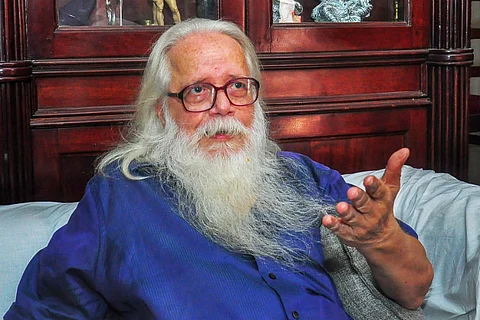

It was not the first shock of his life. On a November day in 1994, a jeep stopped outside his house and policemen asked him to come with them. Nambi Narayanan, a scientist at ISRO, leading a regular life, went with them quietly. Papers would scream for days about an ISRO spy case that they would later call fake.
He would fight for two decades despite the Supreme Court clearing his name in 1998. Last Friday, the Supreme Court made another declaration - that Nambi be paid Rs 50 lakh as compensation. After decades of a life of stress, Nambi says, that day, he could finally be happy.
But for him, the life of stress began a long time ago. He has had a few rude shocks in his lifetime, the first one coming as a telegram when he was a young man in a Madurai college. His father, who took care of the family of five, had died. Young Nambi had not expected it. He was till then a playful lad, who managed to ‘get through with good grades and ranks’, as the old Nambi remembers, sitting at his home in Thiruvananthapuram.
“I was an 18-year-old boy with a sick mother and two sisters to get married. There began a difficult life. I worked in different firms. When other students took money from home, I sent some home. I always had a stressful life, one that was thrust upon me when my father died. I continued with it till this thing landed on me,” Nambi says.
The charge may have landed on him suddenly but a lot of planning seems to have gone behind it. Nambi, a scientist who was instrumental in developing the Vikas engine that would be used for the first PSLV that India launched, talks of the know-how and the know-why of the case. Just as he talks of the know-how and know-why of rocket science. The charges against him were of acting as a spy to send rocket drawings from ISRO to Pakistan. He kept repeating during his interrogation by the Kerala Police, the IB and then the CBI, that you cannot do anything with the drawings even if one were to send it, because you need the know-why, not just the know-how.
“They fixed a crime, they fixed a criminal, they created evidence. The platform is set. But they knew I would come out. So what is the know-why. They wanted to keep me away from my seat (at ISRO),” Nambi says.
In his book Ready To Fire co-written with Arun Ram, Nambi tries to piece together this know-why, this conspiracy that he knows has happened but could give no evidence of.
The Russian-Indian deal of the transfer of cryogenic technology had suffered when the Soviet Union collapsed and there was US interference. Nambi, as the head of ISRO’s cryogenic division, wanted to go ahead with it.
It also happened to be a time when there were factional differences within the ruling party of the State – Congress. Many theories had then been floated. That one faction wanted the late K Karunakaran to step down as Chief Minister and used the ISRO spy case for it. “They – and I don’t know who it is – have stooped so low that they were calling a leader like Karunakaran, a pacca gentleman and a freedom fighter, a spy!”
In the years that had passed after he became a free man, Nambi would wonder about what started it, what the root cause was, and feel sad. But the people that suffered more than him are his family, Nambi says. His wife Meena, who used to go to the temple every day, had one day come back home and said she would not go anymore.
“The temple refused to give her prasadam,” Nambi says, his eyes brimming with tears. There is the love that he confesses at the beginning of his autobiography. Not a good father, nor an ideal father, he wrote, this book is for Meena and the children.
He would write another book, about the behavioural patterns of all the people in the case – the police and the advocates and the media. He would write about all the people who have come to his rescue and later been elevated to a good position in life.
“I am a strong believer of god,” he says. “Even on the day I was arrested, I knew I would come out. Not I 'believed', but I 'knew'. Like that, I know now that these people (behind the conspiracy) would pay for it.”